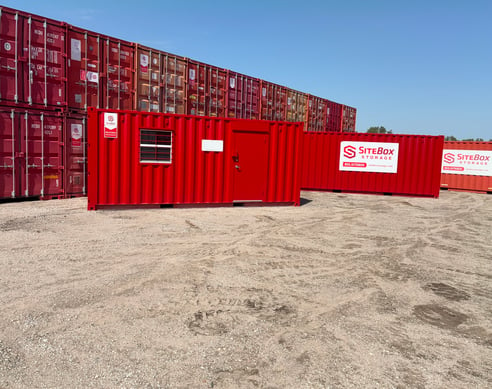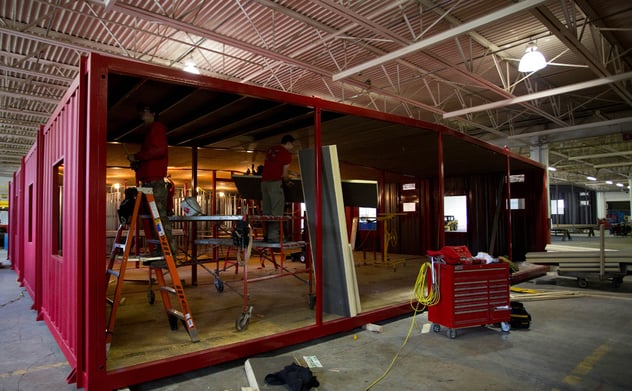Cargo Container Storage Options: Rent, Lease to Buy, or Purchase?

Cargo container storage just makes sense. These steel boxes secure your stuff, protect it from weather and vandalism, and solve storage problems without permanent construction.
One-trip storage containers are built tough. They start as overseas shipping containers, designed to handle brutal conditions. Wind, water, corrosion, rodents—steel construction makes them durable as hell.
Over 17.8 million twenty-foot equivalent units get shipped globally yearly. About 64.3% of containers in use are repurposed for storage solutions. More than 1.2 million new shipping containers are manufactured annually.
Shipping container storage boxes come in three standard sizes: 8' x 10', 8' x 20', and 8' x 40'. But today we're talking about payment options—whether you should rent, lease to own, or buy outright.
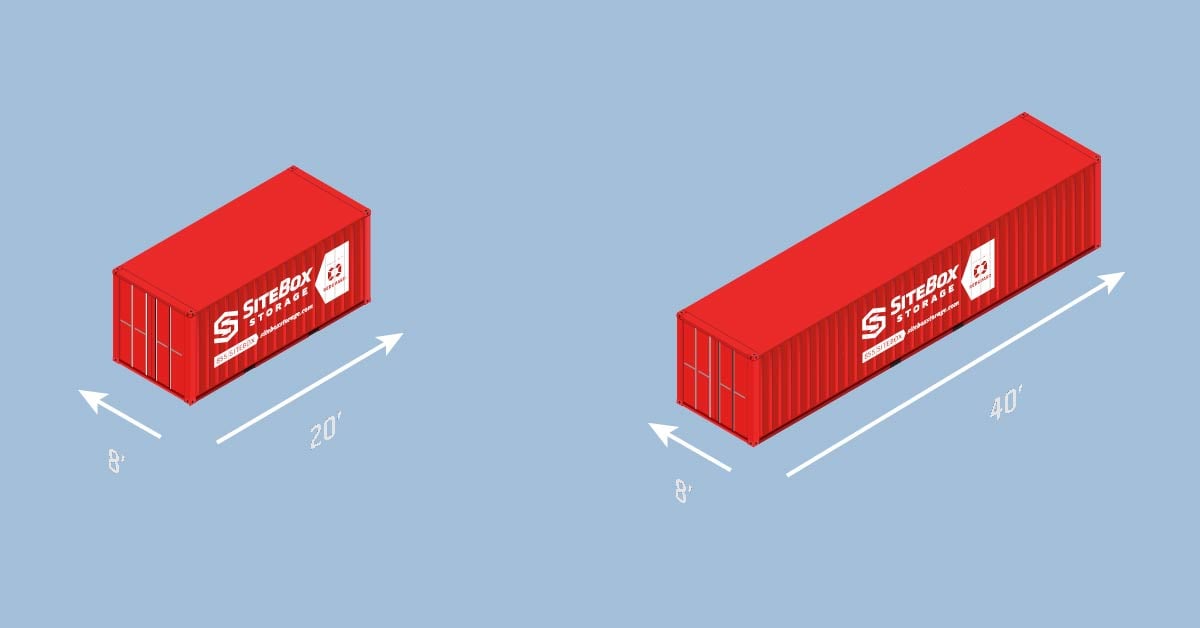
Understanding Your Payment Options
The terms "rent," "lease," and "buy" can be confusing. With apartments, you sign a lease binding you to a time frame. Breaking it sucks. Cargo container storage works differently.
You don't need long-term rental agreements with tons of paperwork. Tell the company how long you need the container. Need it longer? Just tell them. No extra forms.
Some companies bill in 28-day cycles. Delivery and pick-up fees get included in the first month. When you're done, you're done. No surprise invoices later.
Lease-to-own means you want to own a container but pay over time. Most common agreement is 26 months, though it ranges from two to five years. Make the last payment and it's yours.
Buying outright is straightforward. Pay once, own it. Likely cheaper long-term than leasing. You and your accountant decide what makes sense for your books.
Types and Sizes of Cargo Containers
Standard shipping containers come in specific dimensions that work for freight transport worldwide. Most common are 20-foot and 40-foot containers.
An 8' x 10' container gives you 80 square feet. Compact, portable, works for residential use or small business inventory. Easy to fit in tight locations.
The 8' x 20' container provides 160 square feet. This is your workhorse size. Construction sites use these constantly. Enough space without being massive.
An 8' x 40' container doubles that to 320 square feet. Serious storage capacity for industrial operations, large construction projects, or businesses with significant inventory.

All standard containers are 8 feet wide for truck transport. Height is typically 8.5 feet. The cube shipping container variation offers about 9.5 feet of height for extra vertical space.
Materials and Construction Quality
Cargo containers are built from corrosion-resistant steel. Industrial-grade material designed to survive ocean freight transport.
The steel construction makes them incredibly durable. Average lifespan is around 12.7 years for active shipping. Repurposed for stationary storage? They last way longer.
Weatherproof by design. These sit on ships crossing oceans. Rain, salt water, extreme temperatures—containers handle it all. Your stuff stays dry.
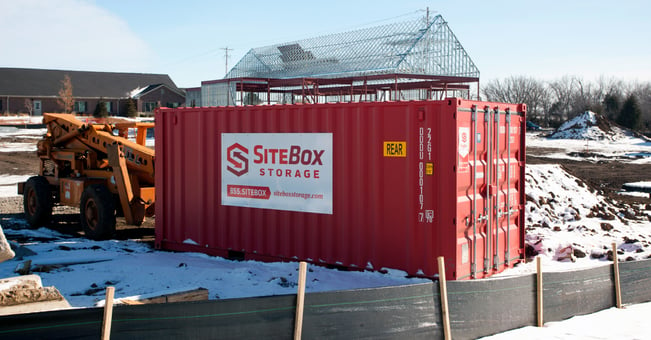
Metal construction makes them lockable and secure. Solid steel doors. Add a good lock and you've got storage that's tough to break into.
The corner fittings are standardized for stacking and securing. Makes containers stackable and transportable by truck, rail, or ship.
Renting vs. Buying: What Actually Makes Sense
Time isn't the only factor. Even with capital available, buying isn't always best. Some customers rent for years, possibly indefinitely.
How you expense the rental matters. If it counts as an operating expense, renting might make more sense. Your accountant can explain how this affects your situation.
Maintenance is minimal, but when you rent, the company handles normal wear and tear. One less thing to worry about.
Businesses needing containers indefinitely often purchase units. They want modifications for their specific situation—modifications not possible with rentals. Painting in company colors, adding logos, custom configurations.
Around 23.5% of freight transport worldwide relies on cargo containers, but storage applications have grown way beyond shipping.
Short-term needs? Rental is obvious. Delivery and pick-up fees get added to first month's rent.
Some people need temporary workspace while starting a business. A pop-up kitchen to test a restaurant concept. A container serves as secure storage for supplies and inventory.
Customization and Modification Options
Standard containers work great as-is, but customization provides real flexibility.
Paint schemes matching your business colors? Easy. Logos and branding on the exterior? No problem. Some businesses use containers as on-site offices or retail spaces where branding matters.
Door placement options vary. Standard containers have doors on one end. You can get doors on both ends, side doors, or roll-up doors instead of swing doors.
Interior modifications include shelving units, electrical wiring, lighting, HVAC, insulation, and partition walls. People convert containers into offices, workshops, retail kiosks, even residential spaces.
Windows and ventilation can be added. Security upgrades include alarm systems, cameras, reinforced locks, and security lighting.
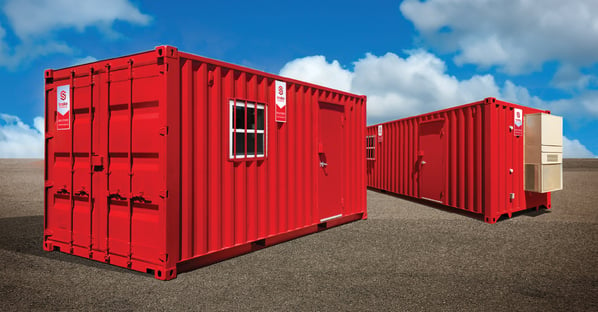
Owning versus renting makes a difference. Rental containers usually can't be modified extensively. If you need specific modifications, buying makes more sense.
Transportation and Logistics Considerations
Getting a container to your location involves actual logistics. You need proper transport and equipment.
Truck delivery is standard. The company brings the container on a specialized truck and positions it where you want it. You need adequate access for the truck—check your roads and driveways.
Ground preparation matters. Containers need level surfaces. Gravel pads work well. Concrete is better for permanent placements.
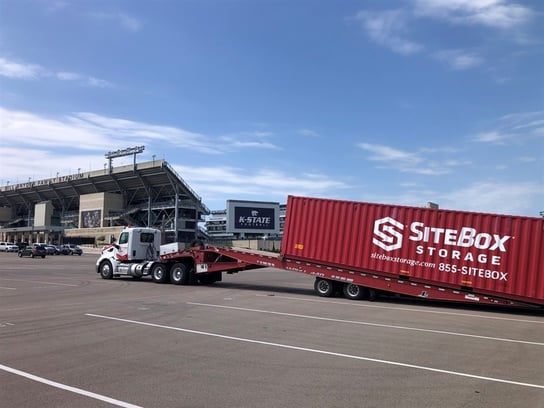
Clearance above and around the delivery area needs consideration. Overhead power lines, tree branches, building overhangs—make sure everything fits.
Some locations require permits for container placement. Regulations vary by state and local area. Check with local authorities about requirements.
Distance affects cost. Local delivery costs less than long-distance transport. Get a quote based on your specific location.
Security and Protection Features
Security is a huge reason people choose cargo containers over other storage options. Steel construction makes them way more secure than wood buildings.
Lockable doors with commercial-grade locks provide the first security layer. Solid steel doors mounted on steel frames. Breaking in requires serious tools and effort.

No windows means no visibility into what you're storing. Thieves can't case what's inside.
Weatherproof construction protects against environmental damage. Water damage, wind damage, pest infiltration—containers prevent it all.
Metal construction resists fire better than wood structures. Rodents and pests can't chew through steel. Important for storing anything pests might damage.
Ground-level storage means no stairs or elevation issues. Loading and unloading happens at grade level.
Innovative Uses Beyond Basic Storage
Storage is obvious, but people get creative with cargo containers. The modular, durable design opens up possibilities.
Mobile offices pop up constantly on construction sites and remote locations. Add windows, insulation, HVAC, electrical—you've got functional workspace. Way cheaper and faster than building.
Retail spaces and pop-up shops use containers for portability and visual appeal. The industrial aesthetic works for certain brands. Common at events, farmers markets, outdoor venues.
Workshops provide secure, weatherproof environments. Equipment storage on job sites keeps expensive tools secure. Construction theft is massive. Locking everything in steel dramatically reduces theft risk.
Seasonal inventory storage works for businesses with fluctuating needs. Emergency and disaster response use containers for command centers and supply distribution.
Agricultural applications include seed storage and equipment storage. Archive and document storage for businesses needing to retain physical records.
Making Your Decision: Rent, Lease, or Buy
How do you decide? Here's what to think through.
Short-term needs under a year? Rent. The math is straightforward. When the project ends, you're done. No selling, no long-term commitment.
Medium-term needs from one to three years? Leasing to own starts making sense. Run the numbers comparing total rental costs versus lease payments.
Long-term or permanent needs? Buy. If you'll use container storage indefinitely, buying makes financial sense. Upfront cost is higher, but spread across years, ownership wins.
Modification requirements push toward buying. If you need significant customization, you're probably buying.
Tax and accounting considerations matter. Work with your accountant. The best option depends on your tax situation.
Capital availability is obvious. If cash is tight, renting or leasing makes more sense than tying up capital.
Get a quote for your specific location and needs. Pricing varies based on where you are, container size, and features. Companies like SiteBox Storage in areas including New Jersey can provide detailed information and pricing.
Frequently Asked Questions
What is a cargo container? A cargo container is a standardized metal box designed for freight transport by ship, rail, and truck. Made from corrosion-resistant steel, they're built to secure goods during shipping and withstand harsh conditions. Standard dimensions make them stackable and easy to transport worldwide.
How does a storage container differ from a cargo container? Storage containers and cargo containers are essentially the same thing. "Cargo container" refers to their original shipping purpose. "Storage container" describes their repurposed use for stationary storage. The construction and dimensions are identical—just different applications of the same product.
What sizes of cargo containers are available? Standard sizes include 8' x 10' (80 sq ft), 8' x 20' (160 sq ft), and 8' x 40' (320 sq ft). All are 8 feet wide and typically 8.5 feet tall. Cube containers offer extra height at 9.5 feet. These dimensions work for truck transport and fit most locations.
Can I use a cargo container for long-term storage? Absolutely. Containers last 12.7 years on average in active shipping use. For stationary storage, they last much longer since they're not experiencing constant transport stress. Weatherproof steel construction protects contents for decades with minimal maintenance.
How much does a storage container cost? Prices vary based on size, condition, location, and whether you're renting or buying. Rental typically runs a few hundred dollars monthly depending on size. Purchase prices range from a few thousand for smaller units to $8,000+ for large 40-foot containers. Get a quote for your specific area and needs.
Where can I buy a cargo container? Through specialized container companies that serve your region. Companies operate across the country in various states. Look for vendors with good reviews, clear warranty information, and experience in your industry. Compare products, pricing, and customer service before deciding.
Can cargo containers be customized? Yes, extensively. Paint colors, logos, door placements, windows, ventilation, interior shelving, electrical, HVAC, insulation, partition walls—modifications are common. Some require professional installation. Customization is easier with owned containers versus rentals since rental units must return to standard condition.
Are storage containers weatherproof? Yes, by design. Built for ocean freight transport, they handle rain, wind, extreme temperatures, and salt water exposure. Steel construction with weatherproof seals keeps contents dry and protected. Proper maintenance of door seals ensures continued weatherproof performance.
How do I transport a cargo container? Specialized trucks handle container delivery and pickup. The company typically includes delivery in rental or purchase price for local service areas. Long-distance transport costs extra. Ensure adequate truck access to your location and level ground for placement.
Is renting a storage container an option? Yes, renting is common and often the best option for short-term needs. Rental agreements are flexible—tell the company how long you need it. Delivery and pickup fees typically include in first month's rent. No long-term commitment required. Extend the rental easily if your needs change.
Final Thoughts
Cargo containers solve storage problems efficiently. Whether you rent, lease, or buy depends on your specific situation—how long you need it, whether you want modifications, and what makes sense financially.
The average container has a long lifespan, especially for storage rather than active shipping. Durable steel construction, weatherproof design, and security features make them valuable for countless applications.
Think through your needs. Short-term project? Rent. Medium-term with eventual ownership? Lease. Long-term with customization needs? Buy. There's no single right answer—just the right answer for your situation.
Contact companies with experience in your state or area. Ask questions about sizing for your storage needs, pricing for your location, and what options make sense. Good vendors will help you make an informed decision.
If you want to learn more about your options for rental, lease to buy, or buying options, contact our expert sales staff today. They'll help you with all the details, including logistics.
